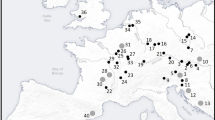Conclusion
Anthropologists have too often supported — in their words, in their presences, and in their deeds — the paternalistic claims of rulers suppressing the very cultures they want to study. Much anthropological work legitimates substitution of the language of Beijing for Hakka and Holo, justifies ignoring Taiwanese culture, and subordinates consideration of its specific features to writing about Chinese civilization, just as Taiwanese are economically and politically subordinated to the ethnic minority dictatorship which still rules Taiwan under the fiction of being the government of China. The “China” that Arthur Wolf and others serve in return for support of their research from what purports to be “the Republic of China” is an egregious, but unfortunately not unique, example.
Similar content being viewed by others
Additional information
Stephen O. Murray is with El Instituto Obregón, San Francisco, California. Keelung Hong is with the Cancer Research Institute, University of California, San Francisco.
As is normal in anthropology, except for Taiwan, native terms are romanized in the native language (in the first author's recording of the second author's Daidiong idiolect, without indication of the extremely intricate tone differentia), not in the official language of the ethnic oligarchy ruling Taiwan (Beijinghua). Mainland place names are rendered in pinyin. We have followed the convention of treating Chinese and Taiwanese personal names as “two words,” because books are catalogued with such names. If personal names are considered as two words (an imposition of the hoary dogma that “words” in Sino-Tibetan languages are monosyllabic), it seems to us that both “words” should be capitalized. For Taiwanese placenames, we have not separated syllables by dashes or by spaces.
Rights and permissions
About this article
Cite this article
Murray, S.O., Hong, K. American anthropologists looking through Taiwanese culture. Dialect Anthropol 16, 273–299 (1991). https://doi.org/10.1007/BF00301241
Issue Date:
DOI: https://doi.org/10.1007/BF00301241




